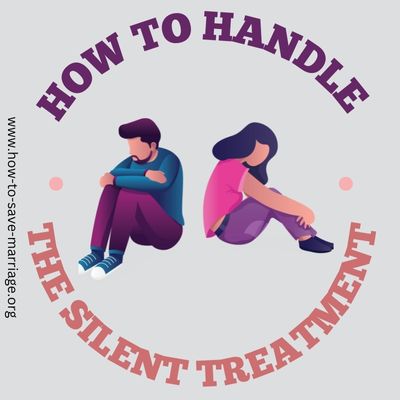Another day and another week go by, and your husband’s silent treatment continues. It all started with something ridiculous, but he won’t budge.
How do you handle the silent treatment with dignity? How do you make it stop not only today but for good?
Silent treatment in a marriage is more common than you think. IMO it’s one of the most horrible ways to handle a fight and creates constant stress, that makes you fear the moment he pulls into the driveway.
As if that’s not enough:
Most silent treatments start with something ridiculous and continue to the point that none of you can even remember why they started in the first place.
Should you try to win the silent treatment or should you handle it in a different way?
We searched and found expert opinions, and the answers are here.
What is a Silent Treatment?
When your husband gives you the silent treatment, he acts like you don’t exist – by phone, text, or in person – for hours, days, or even weeks.
He stops talking to you, usually in the middle of an argument, refuses to keep talking, and even abruptly leaves the room or the house.
What does this mean for you?
The silent treatment basically prevents any chance of resolving a conflict, listening, communicating, and forgiving.
So, what is the purpose of silent treatment and why does he do it?
The Psychology Behind the Silent Treatment
The silent treatment is a passive-aggressive way to move away from “danger” (hurt, frustration, and anger) toward “safety” by trying to control you, manipulate and hurt you.
He is letting you know that he is displeased and punishing you for it.
The receiving end of the silent treatment may feel guilty and ashamed, humiliated, afraid of further punishment, confused, and full of self-doubt. Most of the time, he or she will feel desperate to fix whatever went wrong.
According to Kipling D. Williams, professor of psychological sciences at Purdue University:
Being excluded or ostracized is an invisible form of bullying that doesn’t leave bruises, and therefore we often underestimate its impact”
(This is not the same as being ignored by your husband)
Research done in 2012 shows that people who regularly feel ignored report lower levels of self-esteem, belonging, and meaning in their lives.
How to Handle the Silent Treatment with Dignity
Being on the receiving side of the silent treatment is painful and humiliating. It’s a part of what researchers call the “demand-withdrawal” pattern, and is considered one of the most damaging types of conflicts in a relationship.
However, you can handle a silent treatment with dignity, if you avoid pleasing your spouse, pleading with your spouse, or arguing away his manipulative behavior.
Let me tell you something:
All of these things won’t work, and you will end up with built-up resentment towards him and yourself.
Those who do not plead and beg, or try to fix things in a way that pleases him, usually retaliate with the same silent treatment, and you end up not talking for weeks, while each one of you waits for the other to surrender and apologize.
Becoming aware of this pattern is the first step in making this type of behavior go away, including on your part.
The second step is to take this time to realize that going to war, and trying to “win the silent treatment” is not the way to handle this, even if you think you are right and he is wrong.
As my favorite marriage counselor Mort Fertel says, When it comes to your marriage, you can be right or you can be happy. But sometimes you can’t be both.
Being right is not the highest value; it’s the relationship that matters most. Sometimes you have to choose. Do you want to be right or do you want to be happily married?”
This does not mean that you have to give in and accept this behavior. This means that you need to whip up some emotional intelligence right now and handle this wisely.
I highly recommend that you get Mort Fertel’s free email series to get you started with fixing your marriage)
Here are a few emotionally intelligent ways to handle the silent treatment:
Write him a letter – this letter should not be about the subject of the conflict that started this conflict. It should be about the damage that the silent treatment causes to a relationship. You can use some of the studies linked at the end of this post. Also, add how this behavior makes you feel. Be sure to express your love to him at the end.
Use humor – completely ignore his behavior and his ignoring you, and talk to him as if he is listening, without expecting a response. Once you try it and take it lightly, you’ll see that humor can break down many walls. He will have to realize that sometimes we take ourselves too seriously, and fight over ridiculous things.
Talk to someone you trust – I recommend talking to a marriage counselor that can help you see the bigger picture and give you some professional advice. If you can’t do that right now, I suggest starting with Mort Fertel’s free email series HERE.
Should You Try to Win the Silent Treatment?
Trying to “win” the silent treatment is not a good idea, mainly because it implies that there is a war between you two and you have to win to survive. No relationship can survive when it is in a state of war.
In case you might be asking yourself:
Giving back the silent treatment will only make the situation worse, and will turn into an ego-driven competition that will only make the relationship even worse.
At some point, we have to understand that we are very limited in changing our spouse, and it is even harder than changing ourselves (which most of us struggle with daily).
You are not responsible for ending the silent treatment, but you can learn how to handle it and prevent it from happening again.
It’s all about communication skills and emotional intelligence, which, unfortunately, no one taught us at school.
Is Silent Treatment a Form of Abuse?
The silent treatment can be a form of emotional abuse if it is used often as a way of controlling or punishing or manipulating the other person. It is abusive especially when it includes threats or insults when the intention is to control you.
It’s important to remember that often, people who weaponize silence, come from a place where they feel they have little or no power.
Before You Go…
Have you been trying to solve your marriage problems for a long time? Click the link to see why you should stop trying. And if you are thinking about giving him an ultimatum – here’s my take on ultimatums in a marriage and whether they work.
Rooting for ya,
Lisa
Resources
Paul Schrodt’s research on “the silent treatment”
Müceldili, Büşra. (2019). The Silent Treatment: What We Need To Know More About Ostracism. 175-181. 10.15405/epsbs.2019.12.03.15.
Williams, K. D., & Nida, S. A. (2011). Ostracism. Current Directions in Psychological Science. https://doi.org/10.1177/0963721411402480


